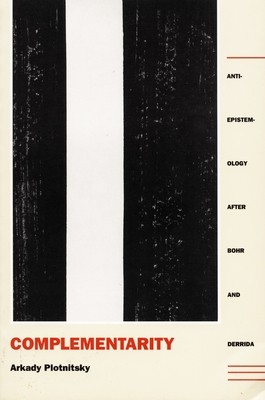
- We will send in 10–14 business days.
- Author: Arkady Plotnitsky
- Publisher: Duke University Press
- ISBN-10: 0822314371
- ISBN-13: 9780822314370
- Format: 15.3 x 23.4 x 2.5 cm, minkšti viršeliai
- Language: English
- SAVE -10% with code: EXTRA
Reviews
Description
Many commentators have remarked in passing on the resonance between deconstructionist theory and certain ideas of quantum physics. In this book, Arkady Plotnitsky rigorously elaborates the similarities and differences between the two by focusing on the work of Niels Bohr and Jacques Derrida. In detailed considerations of Bohr's notion of complementarity and his debates with Einstein, and in analysis of Derrida's work via Georges Bataille's concept of general economy, Plotnitsky demonstrates the value of exploring these theories in relation to each other.
Bohr's term complementarity describes a situation, unavoidable in quantum physics, in which two theories thought to be mutually exclusive are required to explain a single phenomenon. Light, for example, can only be explained as both wave and particle, but no synthesis of the two is possible. This theoretical transformation is then examined in relation to the ways that Derrida sets his work against or outside of Hegel, also resisting a similar kind of synthesis and enacting a transformation of its own.
Though concerned primarily with Bohr and Derrida, Plotnitsky also considers a wide range of anti-epistemological endeavors including the work of Nietzsche, Bataille, and the mathematician Kurt Gödel. Under the rubric of complementarity he develops a theoretical framework that raises new possiblilities for students and scholars of literary theory, philosophy, and philosophy of science.
EXTRA 10 % discount with code: EXTRA
The promotion ends in 21d.21:40:57
The discount code is valid when purchasing from 10 €. Discounts do not stack.
- Author: Arkady Plotnitsky
- Publisher: Duke University Press
- ISBN-10: 0822314371
- ISBN-13: 9780822314370
- Format: 15.3 x 23.4 x 2.5 cm, minkšti viršeliai
- Language: English English
Many commentators have remarked in passing on the resonance between deconstructionist theory and certain ideas of quantum physics. In this book, Arkady Plotnitsky rigorously elaborates the similarities and differences between the two by focusing on the work of Niels Bohr and Jacques Derrida. In detailed considerations of Bohr's notion of complementarity and his debates with Einstein, and in analysis of Derrida's work via Georges Bataille's concept of general economy, Plotnitsky demonstrates the value of exploring these theories in relation to each other.
Bohr's term complementarity describes a situation, unavoidable in quantum physics, in which two theories thought to be mutually exclusive are required to explain a single phenomenon. Light, for example, can only be explained as both wave and particle, but no synthesis of the two is possible. This theoretical transformation is then examined in relation to the ways that Derrida sets his work against or outside of Hegel, also resisting a similar kind of synthesis and enacting a transformation of its own.
Though concerned primarily with Bohr and Derrida, Plotnitsky also considers a wide range of anti-epistemological endeavors including the work of Nietzsche, Bataille, and the mathematician Kurt Gödel. Under the rubric of complementarity he develops a theoretical framework that raises new possiblilities for students and scholars of literary theory, philosophy, and philosophy of science.


Reviews